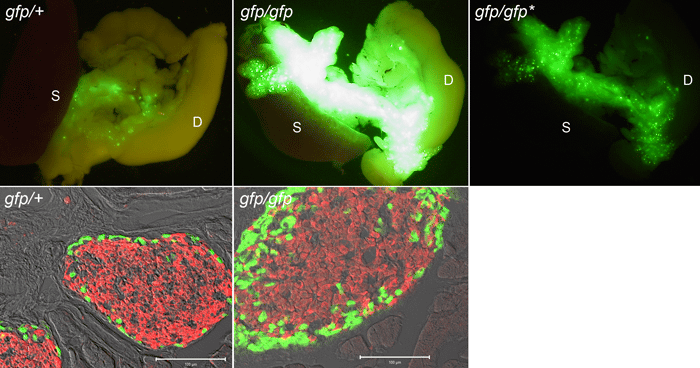Metabolic impact of glucagon deficiencyB6.129S6-Gcgtm1Yhys RBRC02831 Fluorescent images of pancreas (upper panels) and microscopic images of islets (lower panels) in Gcggfp/+ and Gcggfp/gfp mice.In heterozygous Gcggfp/+ mice, green fluorescent protein (GFP) is expressed in islet α-cells (gfp/+). In homozygous Gcggfp/gfp mice lacking all the peptides derived from proglucagon, islet number is increased and α-cells, which express GFP but not glucagon, display marked hyperplasia. The two left images in the top lane, gfp/+ and gfp/gfp, were obtained using a VB-G25 epifluorescent microscope system under the same condition (2-s exposure), while the right image (gfp/gfp*) was obtained with a 0.02-s exposure. S: spleen; D: duodenum. The layer of GFP-positive cells is thickened in the Gcggfp/gfp mouse islet (gfp/gfp in the lower lane), compared with that in the Gcggfp/+ mouse islet (gfp/+). GFP is shown in green and insulin is shown in red. |
Proglucagon, which is encoded by the glucagon gene Gcg, is a precursor of several peptide hormones, including glucagon and glucagon-like peptide 1 (GLP-1). Glucagon is produced in pancreatic islet α-cells through the cleavage of proglucagon by prohormone convertase 2 (Pcsk2), and it stimulates hepatic glycogenolysis and gluconeogenesis in order to increase blood glucose levels. GLP-1 is produced mainly in intestinal L cells and stimulates insulin secretion to lower blood glucose levels.
Dr. Hayashi and colleagues have recently established mice lacking Gcg by replacing Gcg with cDNA for GFP (Gcggfp/+ mice) [1]. The serum concentration of insulin and the expression of enzymes involved in the conversion of amino acids to metabolites in the liver are reduced in Gcggfp/gfp mice [2]. Pregnant Gcggfp/gfp females show high blood glucose levels in late gestation, a decreased pregnancy rate, and smaller litter size [3]. Conversely, blood glucose levels in non-pregnant Gcggfp/gfp mice are not significantly different from those in wild-type mice. The metabolic impact of proglucagon deficiency may be ameliorated by lower plasma insulin levels and by glucagon-independent mechanisms that maintain gluconeogenesis. Indeed, Pcsk2 knockout mice and glucagon receptor knockout mice both exhibit increased production of GLP-1, which is absent in Gcggfp/gfp mice [4]. Gcggfp/gfp mice provide the opportunity to clarify the development, differentiation, and function of Gcg-expressing cells, as well as the physiological and pathological roles of glucagon in metabolism.
| Depositor | : | Dr. Yoshitaka Hayashi Department of Genetics, Research Institute of Environmental Medicine Nagoya University |
| References | : | [1] | Hayashi Y, Yamamoto M, Mizoguchi H, Watanabe C, Ito R, Yamamoto S, Sun XY, Murata Y. Mice deficient for glucagon gene-derived peptides display normoglycemia and hyperplasia of islet alpha-cells but not of intestinal L-cells. Mol Endocrinol; 23(12):1990-9, 2009. |
| [2] | Watanabe C, Seino Y, Miyahira H, Yamamoto M, Fukami A, Ozaki N, Takagishi Y, Sato J, Fukuwatari T, Shibata K, Oiso Y, Murata Y, Hayashi Y. Remodeling of hepatic metabolism and hyperaminoacidemia in mice deficient in proglucagon-derived peptides. Diabetes; 61(1):74-84, 2012. | ||
| [3] | Sugiyama C, Yamamoto M, Kotani T, Kikkawa F, Murata Y, Hayashi Y. Fertility and pregnancy-associated beta-cell proliferation in mice deficient in proglucagon-derived peptides. PLoS One; 7(8):e43745, 2012. | ||
| [4] | Hayashi Y. Metabolic impact of glucagon deficiency. Diabetes Obes Metab; 13 Suppl 1:151-7, 2011. |





